Photo: BELIFT LAB
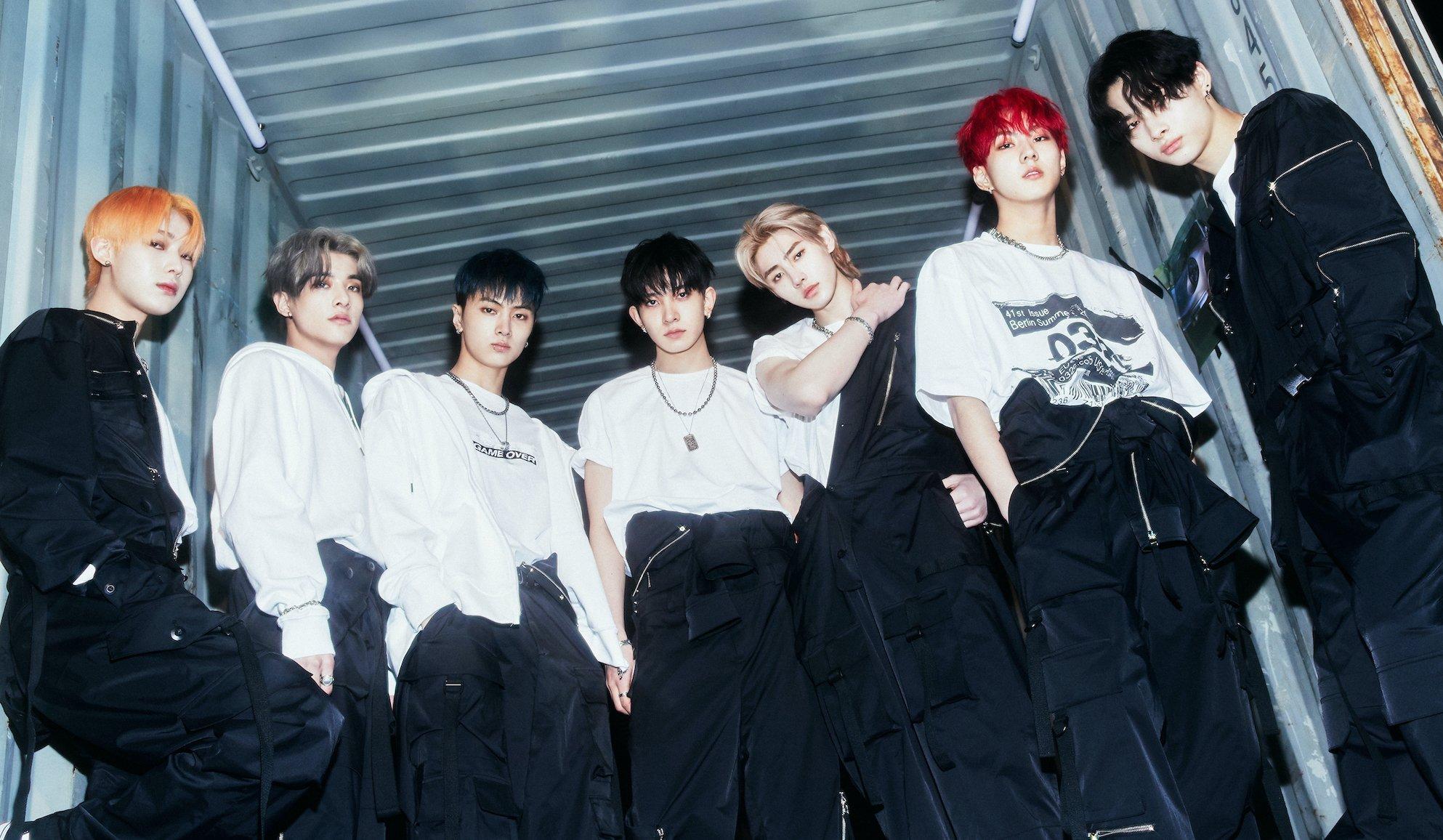
interview
ENHYPEN On Trying New Sounds On 'Manifesto: Day 1': "We Worked Really Hard To Show An Improved Version Of Ourselves"
K-pop septet ENHYPEN detail why it was important to explore genres like Chicago drill and rap on their third mini album, 'MANIFESTO: DAY 1.'
Since their debut in late 2020, ENHYPEN have been heralded as the next big thing in K-pop. Formed by Belift Lab — a joint venture between entertainment companies HYBE (home of BTS and TXT) and CJ ENM (KCON producer) — the guys have had a strong backing and big shoes to follow. But they've consistently lived up to the hype.
ENHYPEN's first two album series, BORDER and DIMENSION, saw the seven-member group achieve record-breaking sales and grow their fanbase rapidly — even selling a million copies of their debut studio album, DIMENSION: DILEMMA, last year.
Now that their spot is cemented, the septet are exploring the world on their own terms with their third mini album, MANIFESTO: DAY 1. Released on July 4, the project explores diverse genres like Chicago drill, pop rock, alt rock, and old school hip-hop.
From the start, ENHYPEN have aimed to be the voice of their generation through their lyrics and messages. But at their core, they're just seven young boys who love music. This is palpable as GRAMMY.com sat with them via Zoom, where Jungwon, Heeseung, Jay, Jake, Sunghoon, Sunoo, and Ni-ki excitedly discuss their involvement in creating MANIFESTO: DAY 1 and their upcoming fall tour.
In just a 30-minute conversation, it was clear that ENHYPEN are enjoying the ride they're on together. They laugh at each other's jokes and finish each other's sentences — and combining that chemistry with their sonic connection on MANIFESTO: DAY 1, all of their success makes perfect sense.
You just wrapped up your first trilogy of albums, which means the end of your introduction to the music world. What lessons are you taking away from the last two years of being rookies? What impression do you hope listeners have?
Jungwon: K-pop has been popular for a while so, not only us, but also the public grows as well, and their expectations get really high. I think we tend to work even harder to live up to those high expectations.
We constantly think about how we can bring in something new, something fresh to the public. We're trying to bring as many new genres as possible and try as many genres as possible. For this album, theme-wise, it's called a manifesto. We're declaring a lot of our own stories in this album as well.
MANIFESTO: DAY 1 is a step forward as you guys mature as a group. Have you gotten to challenge yourselves with the making of this album? What can we expect to change about the group going forward?
Heeseung: For this album, we have tried this new genre called Chicago drill, and it's also our first time trying rap. I don't know how that's gonna be received. Jake also participated in writing the lyrics. Some of the members took part in making the cover designs, so we were directly involved in the album-making process. I'm sure ENGENE will love this album.
As you mentioned you guys are showcasing your rapping skills on "Future Perfect". Why was this the right time to add this new layer to your music, and what do you think it adds to the song?
Ni-ki: "Future Perfect" is a song that declares "we will take the leap forward, come along with us" to everyone in our generation. So, we tried many new different things for this album, you know, the rapping and also performance-wise. We worked really hard to show an improved version of ourselves.
Jake, you participated in songwriting for "SHOUT OUT." What can you say about your involvement in this song? And what would you like to write about in the future?
Jake: When we first got the song, they told us that it was going to be a song that we can really connect with our fans and perform with our fans, like sing-along together. So in my mind, I had to kind of imagine what I would feel and what I would experience when we go on a tour or perform to our fans in person.
It's pretty fun writing the lyrics. And also, when I heard that my lyrics got chosen for this song, I was really excited and really honored to be a part of the song.
What is enticing about some of the genres that you've tried this time?
Heeseung: We actually enjoy listening to different genres of music and each member has very different styles in music as well. We prepared something very new to show that we have grown this much.
For the title track, we're speaking to our peers in our generation. For the track "ParadoXXX Invasion," we are actually taking a jab at adults, so we're kind of delivering these strong messages through our music. I think the process of listening to them, practicing them and making our own music is very attractive. When we listen to the final result, it's, you know, very attractive.
Are there any genres that you haven't tried yet that you'd like to try? What genre best showcases ENHYPEN's style?
Jake (pointing at Heeseung): He wants to try slow jams.
Heeseung: A cappella too.
Jake: I like jazz!
Heeseung: Gospel! Or like Brian McKnight. Do you know Brian McKnight?
Yeah!
Heeseung: I want to do that style.
Jay: We're still on a journey to find our unique color. We're trying many different genres for that journey. Usually, for our title tracks, we convey these very strong images through our title tracks but, also, at the same time, for every album we have these soft-pop vibes like "TFW" and "Polaroid Love" for B-side tracks. I think we're really working hard and really trying to bring as many different genres as possible.
Jungwon: We used to do hip-hop and refreshing concepts like before. Now that we did Chicago drill, it's something very new and unfamiliar to us. I can't even imagine what we're going to do next. Something very new.
Jay: Maybe opera.
Do you each have a favorite track on this album?
Jake: For me it has to be "SHOUT OUT."
Jungwon: "SHOUT OUT"? Me too!
Jake: Oh really? Let's go!
Sunghoon: "Future Perfect."
Ni-ki: "Future Perfect."
SUNOO: "TFW."
Heeseung: "ParadoXXX Invasion" and "SHOUT OUT."
Jay: My favorite is "SHOUT OUT."
You guys are gearing up for your first U.S. tour this fall. What cities would you hope to perform at and what are you nervous or excited about regarding the tour?
Sunoo: It's actually our first time going on a tour — we have never toured before. So we want to go to many different regions. We're planning to go to six cities in the U.S. this time. We participated in KPOP.FLEX [festival in] Germany not long ago, and we received so much energy from the fans in person, so we hope that we can receive as much good energy through this tour as well.
What are your future goals as a group? What do you think fans should take note of when they listen to this new album?
Jake: Our goal was always the same from the beginning. It was to meet our fans in person more often and show our fans what we can do on stage. As a group, we want to always grow in terms of music and performing, and in general, we always want to grow and become the best version of ourselves.
Jungwon: It is the most important thing to meet our fans and bond with our fans in person. I also hope that our music reaches not only our fans, but the public — the audience will enjoy listening to the music, and I think that will be really great.
What sets ENHYPEN apart from other 4th gen Kpop acts? Is there a message in your music that resonates with you most?
Sunghoon: I think our strength is doing music that our peers can really relate to. I hope that we can continue to be artists that can declare the thoughts and ideas of our peers on their behalf.
Everything We Know About J-Hope's New Solo Album 'Jack In The Box'
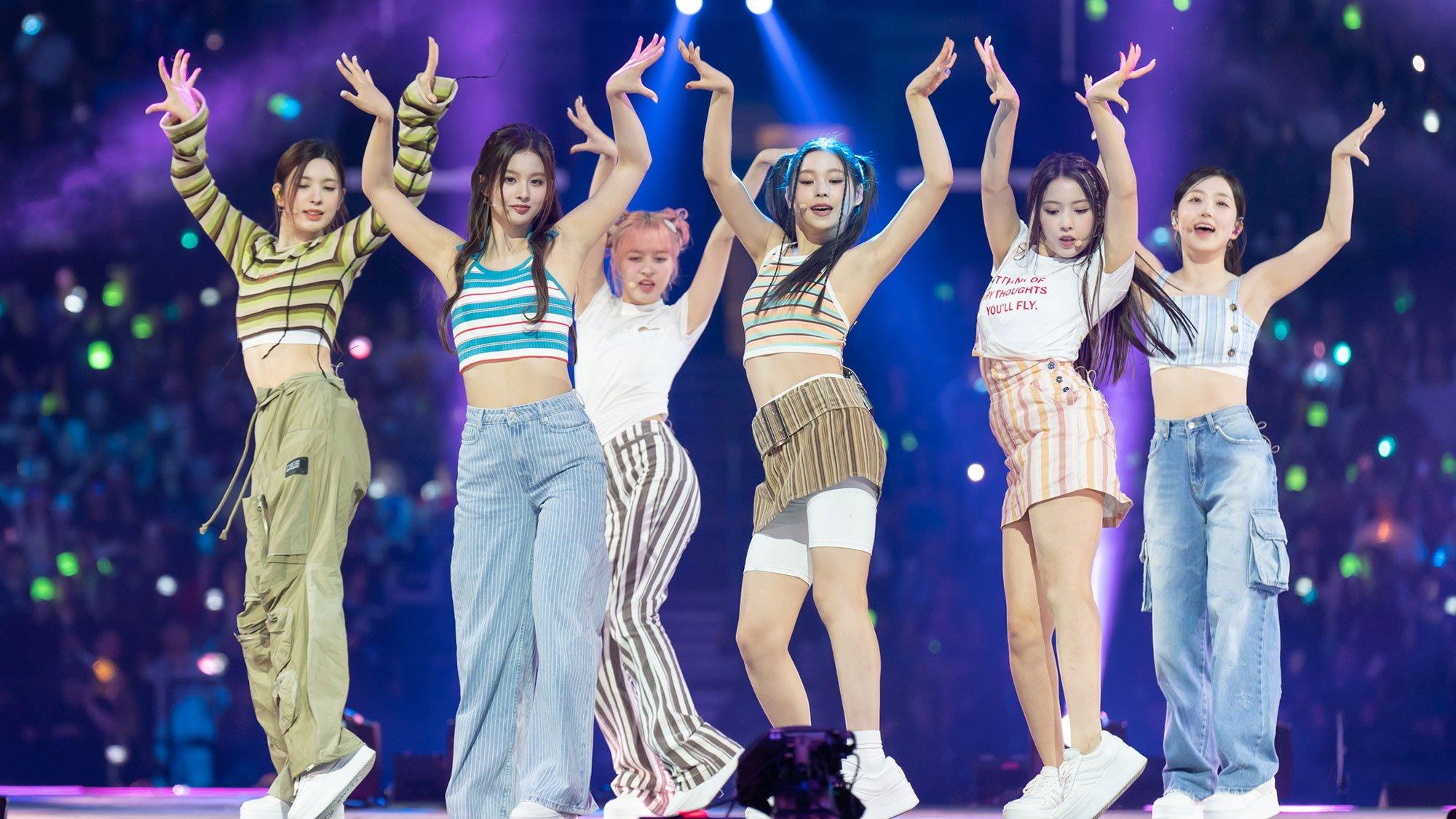
Photo: CJ ENM
list
KCON L.A. 2024 Returns: Get Ready With This Playlist Featuring NCT 127, Zerobaseone, ENHYPEN, Zico & More
The ultimate K-pop festival-convention returns to Los Angeles July 26-28, featuring a star-studded lineup with over 20 artists — including ENHYPEN, NCT 127, and Jeon Somi — interactive experiences, and unforgettable performances.
Ever since it first began in 2012, KCON has been a delightful surprise for attendees. Turn right on the convention floor, you might receive a goodie bag filled with high-quality skin care products. Turn left, and you could stumble into the first-ever performance of a K-pop group in the U.S. All this happens before the main concert even begins at night.
Returning to the L.A. Convention Center and Crypto.com arena from July 26-28, this year’s hybrid South Korean pop culture festival-convention event will host over 20 artists.
The line-up ranges from popular acts around like ENHYPEN and NCT 127 to '90s K-pop legends g.o.d and hip-hop icon Tiger JK (aka Drunken Tiger), plus burgeoning acts, including the newly formed seven-member girl group, IZNA, from the TV competition show I-LAND 2. KCON L.A. 2024 offers an array of musical exploration for anyone enraptured by the South Korean music scene.
Read more: 11 Rookie K-Pop Acts To Know In 2024: NCT Wish, RIIZE, Kiss Of Life & More
After days of meet-and-greets, showcase performances, and a special KCON Stage, each night of this year's KCON will culminate in a full-blown concert that will air in South Korea as part of the M Countdown music show.
Whether you’re a fan of soloists like Taemin, Zico or Bibi, girl groups like Kep1er and NMIXX, or boy bands like Zerobaseone and TWS, this KCON is undoubtedly for you. There are also surprises for anyone intrigued by changing entertainment technology, like Apoki, a virtual singer designed as a bunny from outer space.
While you may not (yet!) be a fan of all these artists, familiarize yourself with all that they have to offer with this playlist featuring some of their most popular and newest songs ahead of this year’s KCON L.A.
More K-Pop News
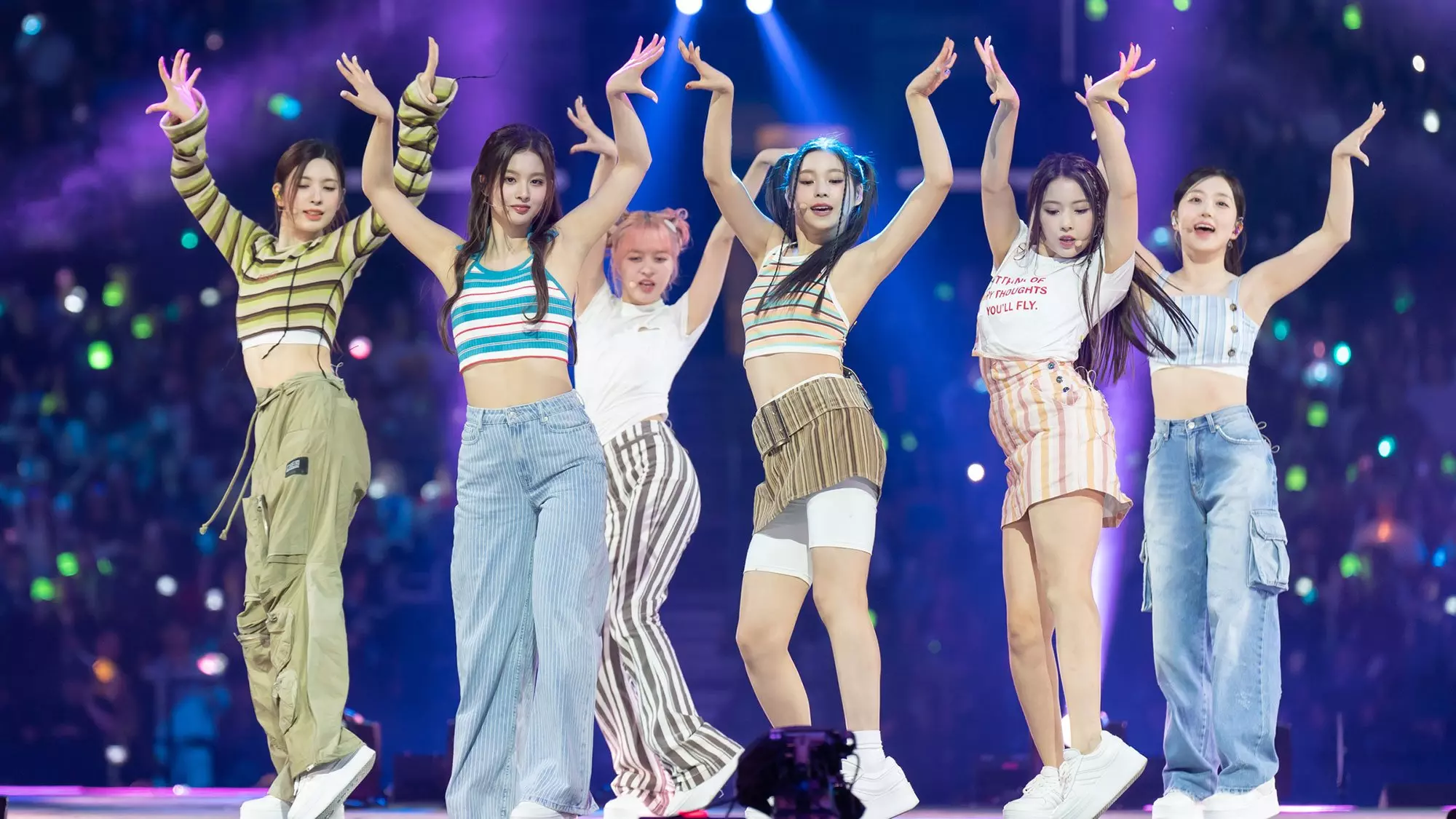
KCON L.A. 2024 Returns: Get Ready With This Playlist Featuring NCT 127, Zerobaseone, ENHYPEN, Zico & More
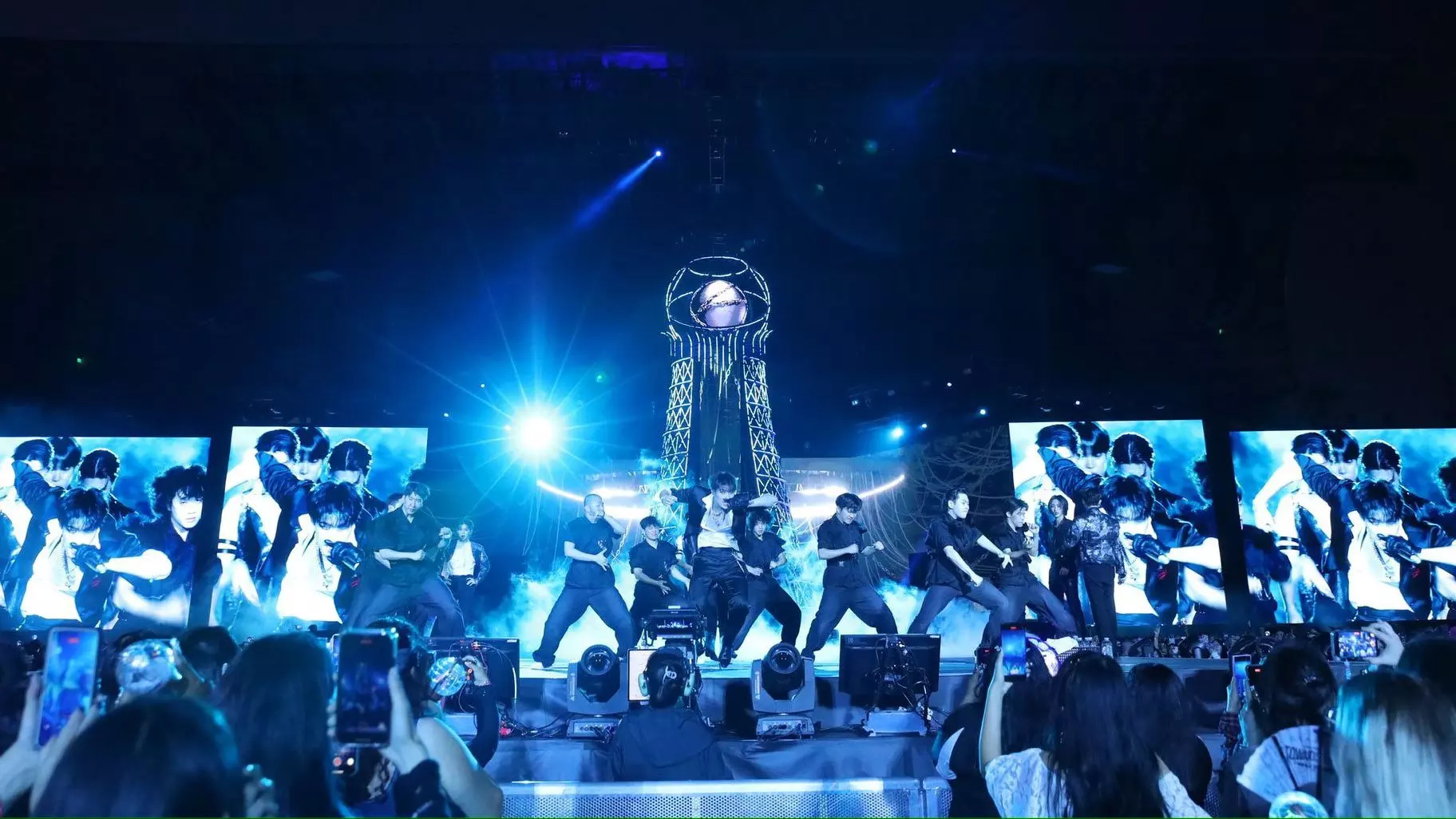
ATEEZ’s First U.S. Stadium Show Was A Triumph & Testament To Their Growth
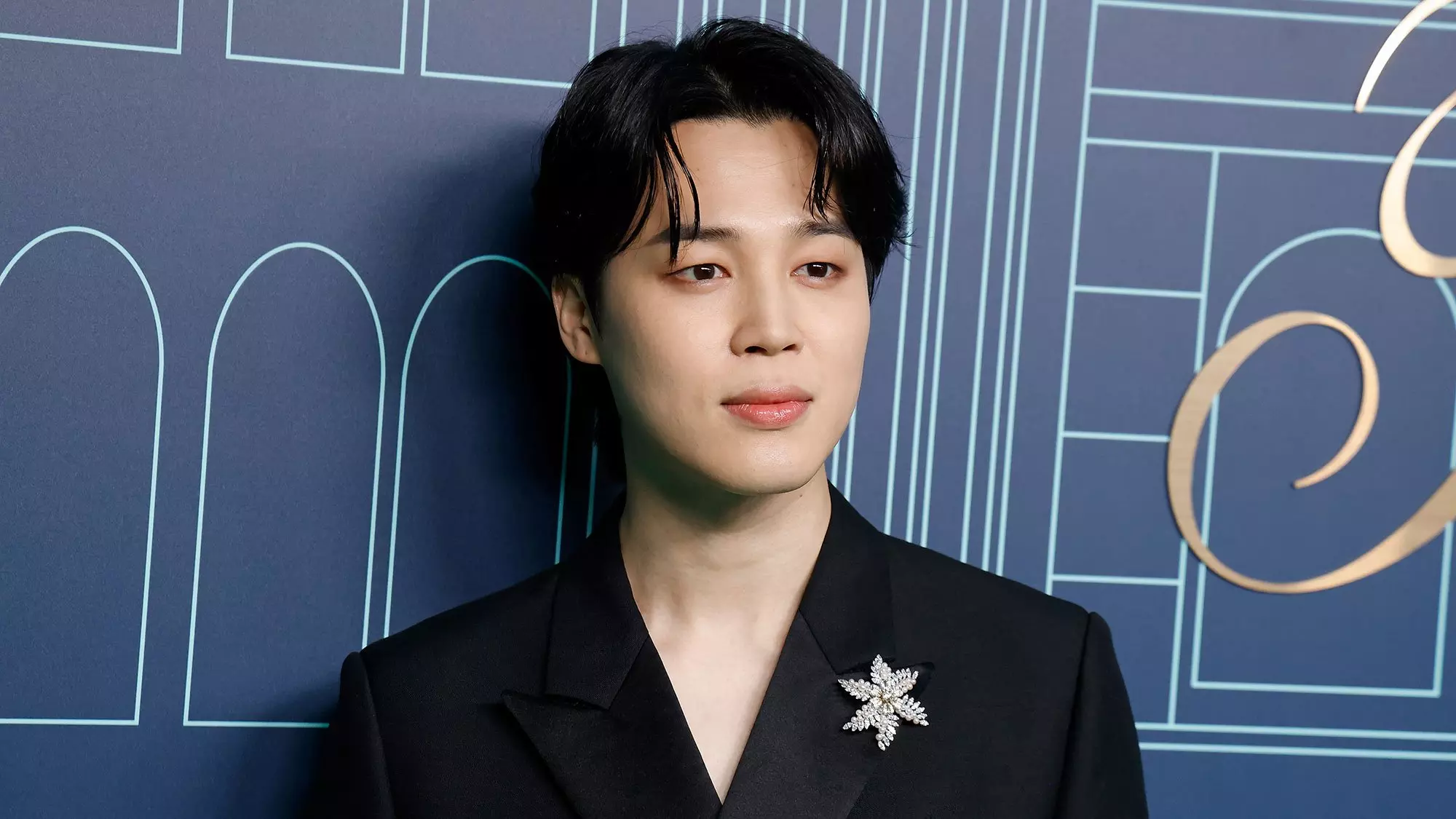
5 Takeaways from BTS Jimin's New Album, 'MUSE': A Bold Exploration Of Love And Inspiration

NCT 127 Essential Songs: 14 Tracks You Need To Know From The K-Pop Juggernauts

ENHYPEN And JVKE "Say Yes" To Cross-Cultural Collabs & Exploring New Genres
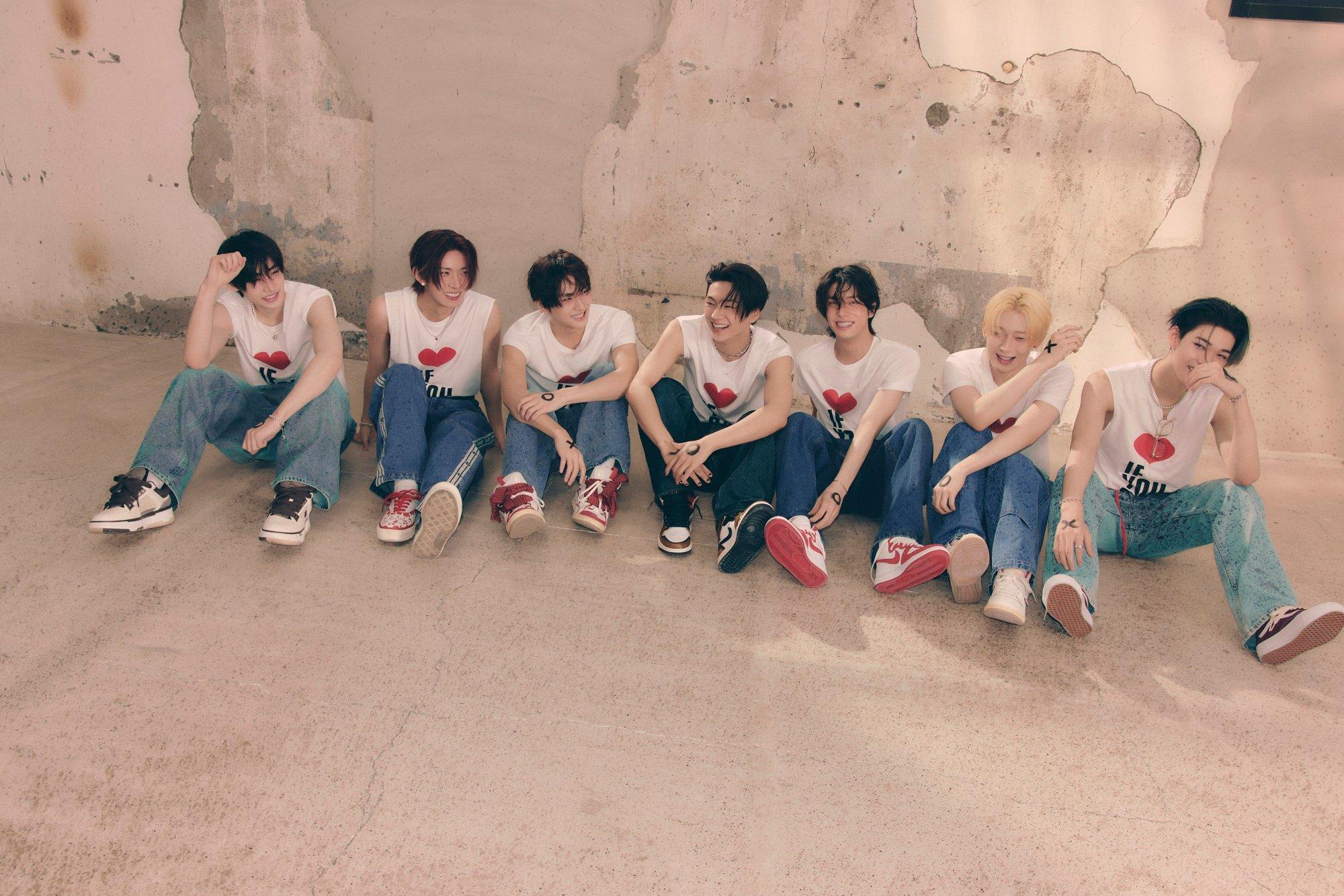
Photo: BELIFT LAB
interview
ENHYPEN And JVKE "Say Yes" To Cross-Cultural Collabs & Exploring New Genres
The K-pop group and American songwriter/multi-instrumentalist were big fans of each other — so much so that they bridged continents to create music. ENHYPEN and JVKE discuss creating "XO (Only If You Say Yes)," and innovating by staying true to yourself.
During the COVID-19 lockdown in 2020, Jacob Lawson decided to use his time at home to share songs on TikTok. Trained in piano, guitar, and drums, the Providence, Rhode Island-based teen's creativity and knack for whimsical hooks resonated with millions. By 2021, Lawson was better known as JVKE — the singer and songwriter behind viral hits "Upside Down," "golden hour," and many more.
At the same time, on the other side of the world, in Seoul, South Korea, 23 K-pop trainees competed against each other on the survival show "I-Land." The seven victors went on to form boyband ENHYPEN — comprised of four Koreans (Heeseung, Sunoo, Sunghoon, and Jungwon), one Korean Australian (Jake), one Korean American (Jay), and one Japanese member (Ni-Ki). Despite the lack of in-person events in 2020, the group quickly became a coveted name, topping Korean charts with every release and sweeping a handful of awards.
Fast-forward to 2024, and these parallel lives have crossed paths with each other: ENHYPEN covered JVKE’s songs on social media, JVKE saw it and was impressed by their talents. Soon enough, they were working together.
While differences abound — JVKE is under global label AWAL and does everything from home, for example, while ENHYPEN went through years of dutiful training under label BELIFT LAB — their connection was immediate. The Gen Z artists share the same wavelength of thoughts and, above all, bonded over their love for a universal connector: music.
The result is ENHYPEN’s latest single, "XO (Only If You Say Yes)," off their sophomore studio album, Romance : Untold. Crafted by JVKE, who also features in its English version, the summery track represents a new musical and conceptual direction for ENHYPEN. So far, most of their work explored darker sounds and vampiric leanings, but now they show a sweeter side, ready to embrace all the facets of love.
Over Zoom, JVKE met ENHYPEN once more to talk about working together, being creative in the age of TikTok, and the future of music. ENHYPEN will also be featured in HYBE: We Believe In Music, A GRAMMY Museum Exhibit, which opens in Los Angeles on Aug. 2.
How did your collaboration come to life? Who contacted whom first?
JVKE: I remember the first time I saw Sunoo singing "Golden Hour," and that was probably my first time seeing them and interacting a bit.
I dug a little deeper, got to hear their music and see all sorts of stuff from them, and then with Heeseung singing "This Is What Falling in Love Feels Like" — that cover is amazing. I tried to reach out through [X/]Twitter, like, How can I get in contact with these guys? And, yeah, from there we got to connect, and we made some cool stuff happen.
Did you know anything about K-pop before meeting ENHYPEN?
JVKE: When I first saw ENHYPEN, just the mesh of them as a group, you see the pictures and how all of them are styled together. But watching them dance in combination with the music, really opened my eyes to what K-pop could be, because I hadn't really seen much of it.
Seeing these guys, I feel like it takes music to a whole different level of performance. I think these guys are even greater than musicians, they are also just performers, state of the art. They are amazing.
ENHYPEN, what do you think of JVKE's music? And what were your thoughts when you learned you would be working together?
Jake: We all knew his songs way before we met him, and we were all big fans. We used to listen to all of his music before we met him, and when we heard that we got a chance to work with him, when we heard the demo for the title song, we knew that it was going to be such an amazing collaboration. We were very excited, even from the start.
But I think our first impression when we actually met him in person is that he's very tall. [Laughs.] And we just connected straight away. We come from two different parts of the world, and we are both doing different styles of music, but in this collaboration you can see that we were able to connect through music, and [that’s] wonderful.
Is there anything specific that you learned while working together? Or something new that you didn't expect?
Jungwon: I was really surprised that he is the same age as Heeseung.
Heeseung: I also didn’t know.
He could be part of ENHYPEN.
JVKE: That's what I want. I'm signing up. I'm doing my audition now. [Laughs.]
JVKE, what was your main takeaway from ENHYPEN’s music and from their new album, 'Romance : Untold?'
JVKE: With stuff that I had heard from before, this [album] is definitely a new take on their sound. I think they're creatively evolving, and to get to be a part of that has just been so much fun. I just can't wait for people to hear what we got on the way.
ENHYPEN, what did you think of the new genres that you are exploring in this album?
Heeseung: When we first heard the demo [for "XO"], we all thought that it was a really great song. And the thing about this song is that it reflects all the creativity that JVKE has.
Jake: This song is very new to us, but I feel like one of our goals when we're working on a new album is to always try something different. This title song is such a big step for us, and I think it's a really good comeback.
JVKE, your songs are very romantic. Did that help to create "XO" and make it fit into their 'Romance : Untold' album concept?
JVKE: For sure. It was really cool to work on the song with the guys, and I think that you will definitely be able to tell the parts that I'm really — you know, I tend to write a lot of love songs. That's just how I am.
ENHYPEN, this is the first time you dive into a full-on romantic concept. What do you think of this evolution in your music, and of this theme?
Sunghoon: In this album, we tried to set a scene where our fans could have this heart-fluttering feeling after listening to [it]. We really put a lot of thought towards our fans, Engene. We showed a darker side in previous albums, but this time it's summer, and it's been a long while since we released a studio album, so we wanted to show a different side. I think that's going to draw attention from a wider audience.
JVKE, you found a lot of success through TikTok. What do you think of the platform as a creative medium? And how is it shaping the way music is created?
JVKE: I think it just made it easier to access potential fans, the public, or people who may have never heard your music before, and that gives any creative person a shot. If you can just put some music online, you don't have to have any sort of thing going for you. If the video is a great video, and the music's great, it'll reach people. I love that. I love that's the world that we live in, that there's not really a barrier to entry anymore. And I think that allows creativity to really ramp up, like, we don't have to move really slow with just a few artists. There's a lot of new artists coming out, pushing out new sounds and creativity. I love that so much.
How has this collaboration inspired you further on your own work?
JVKE: Even the song that we did together, it was a creative stretch for me. I hadn't really done much stuff like this, so it gets me excited to see what people are going to think of it. I'm always trying to do new things and seeing how [mine and ENHYPEN’s] worlds came together definitely inspired a lot of cool stuff. Even when we were in the room together working on stuff, it was very inspiring for me, so I think that inspiration is going to ride for a while.
ENHYPEN, how has this collaboration inspired you and future things you want to try as a group?
Ni-Ki: "XO" is a style that we have never tried before, and every time you try out new things, it can be challenging at times, and have a bit of pressure. But through this collaboration, we learned that we can try various different things going forward, and we can actually pull off these different styles.
Sunoo: What Ni-Ki said is so correct. Doing this collaboration with JVKE is definitely opening a lot of new styles for us in the future, and I think it's going to be great.
What do you think that is necessary to craft a hit song these days?
Jake: A really catchy hook. And like JVKE mentioned, Tiktok and that sort of short videos are very popular right now, and I think having a catchy melody is what gets people’s attention. That's what young people, like us, like these days.
JVKE: I agree 100%. You gotta have the hook. And now when I'm in the studio trying to make music, getting the production behind it innovative and creative, or just stripping it back, I find that fully committing to an idea, even if it's a little bit crazy, even if it's not what people would expect from you, is the best part about it. And I think Gen Z is always looking for something new and fresh, because the attention span is so quick. So, right now, it's good to keep people on their toes.
What are some "rules" or common techniques in music writing and producing that you don't agree with, and that you like to do your own way?
Jungwon: One of the things that caught my attention was the fact that we usually record in the studio, but we learned that JVKE made all of his work from his home. That was a big surprise, because although he did it [that way], everything is good quality.
JVKE: Thanks, guys. I agree. Definitely, there's certain points when I really need to take my time and get it exactly how I want it, but you know, I think you can always work with whatever you have. And I like that for up-and-coming songwriters. Just by having a computer, you can do pretty much everything on there, and sometimes that's what helps people to figure out their sound. You just do what you can and, over time, you can add in more high quality elements and use some better equipment. So, I love that you don't have to have too much. You can work with whatever you have.
Aside from "XO," do any of you have a favorite track in this album? Why?
Heeseung: I like "XO," especially the English version is really good, and outside of that it would be "Paranormal."
Jay: I think for me it’s "XO" English version too, because JVKE featured as a vocalist.
Jake: Obviously, "XO" is my favorite song on the tracklist, but I really like "Brought The Heat Back" too.
What do you envision for the future of K-pop and of music in general?
Jake: That's a good question. I think even from this collaboration we're doing right now with JVKE, you can tell that K-pop isn't determined by language or anything like that. I feel like it's already gone global, and that's going to continue in the future as well. I think music can bring the world together. I know that in some places in the world, there's people that don't know much about K-pop or Korea in general, and you know, a couple years back, when I was living in Australia, K-pop really helped me learn about Korean culture. I think we're doing that for other people around the world as well. As an artist, part of K-pop is to always show the world what it is and what Korea and its culture are.
Heeseung: What's important is that we put in the creative element to make something new out of existing genres. There are many great musicians out there, and I think if they continue to share what they have, we'll be able to advance music further. Recently, I had the chance to experience a [songwriting] camp, so I got to meet many different musicians and make different songs. If we had more of these kinds of opportunities going forward, that would be great.
Jay: We had a lot of dark and deep concepts or title tracks for a while, so this kind of collaboration with JVKE kind of breaks [that]. I think a lot of musicians breaking their own line and challenging themselves will make the future of K-pop.
Learn more: What's Next For K-Pop? A Roundtable Unpacks The Genre's Past, Present And Future
JVKE, do you have any thoughts?
JVKE: I agree with all the stuff that the guys were saying, like, taking in all of the different inspirations. I think if songwriters continue to just be themselves and write what they want to write, we'll continue to get new and innovative music. I don't think we'll ever run out of new ways to create music. And so, I always try to encourage other songwriters to just keep writing what's coming to you. You don't have to put it in a box.
Even with ["XO"], I wasn't trying to put it in a perfect box, it just was what it was. Sometimes a song just has to be allowed to be what it is, and then you can put it in a box if you need to, but never compromise the art. The art comes first. And as long as people do that, the future will continue to have amazing music.
More K-Pop News

KCON L.A. 2024 Returns: Get Ready With This Playlist Featuring NCT 127, Zerobaseone, ENHYPEN, Zico & More

ATEEZ’s First U.S. Stadium Show Was A Triumph & Testament To Their Growth

5 Takeaways from BTS Jimin's New Album, 'MUSE': A Bold Exploration Of Love And Inspiration

NCT 127 Essential Songs: 14 Tracks You Need To Know From The K-Pop Juggernauts

ENHYPEN And JVKE "Say Yes" To Cross-Cultural Collabs & Exploring New Genres
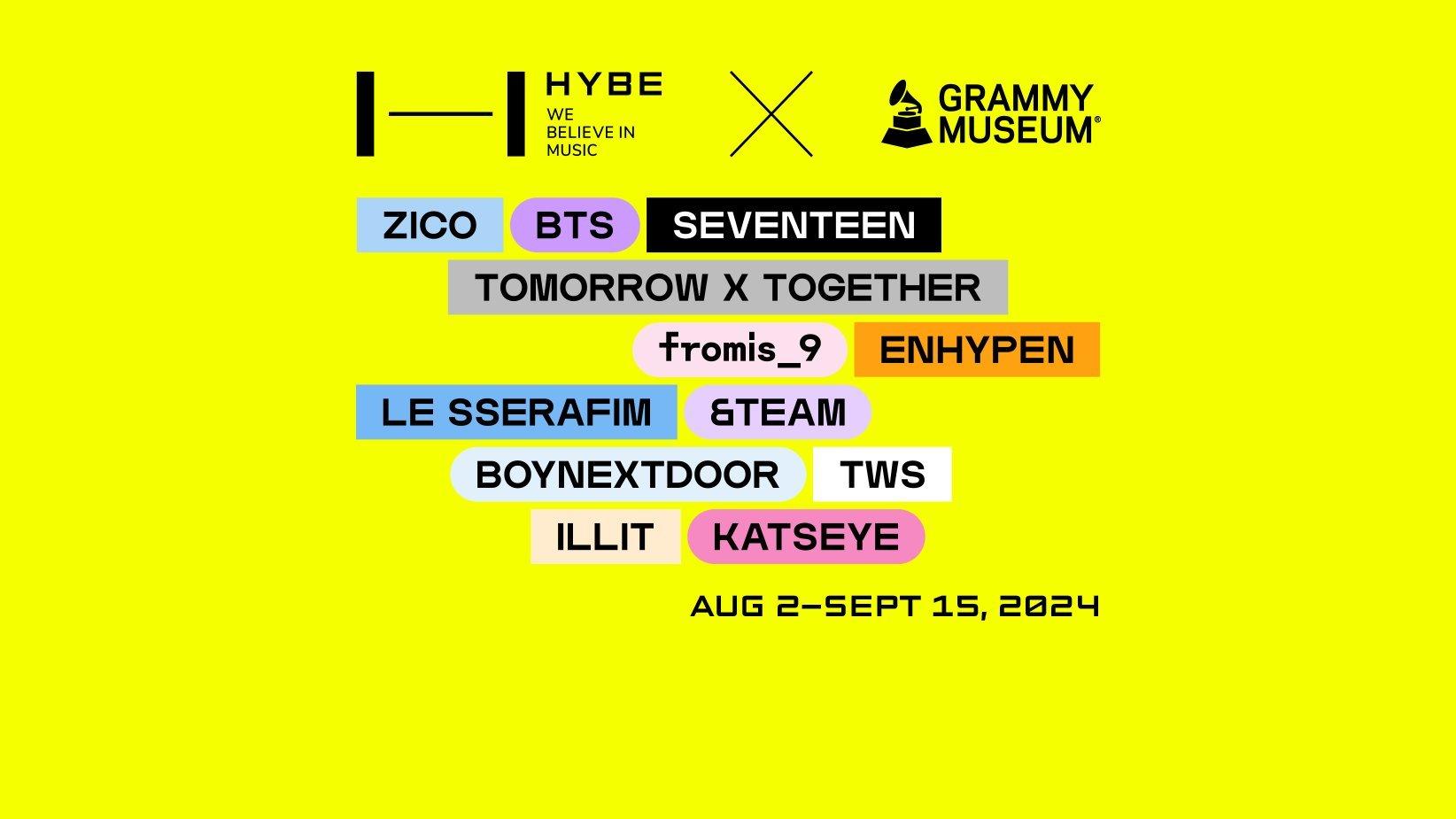
Graphic courtesy of the GRAMMY Museum
news
GRAMMY Museum Partners With HYBE For New K-Pop Exhibit 'HYBE: We Believe In Music' Opening Aug. 2
Running Aug. 2 through Sept. 15, the GRAMMY Museum exhibit showcases artifacts from superstar HYBE artists, including BTS, SEVENTEEN, TOMORROW X TOGETHER, ENHYPEN, LE SSERAFIM, and many more.
The GRAMMY Museum joins forces with HYBE to present its newest exhibit, HYBE: We Believe In Music, A GRAMMY Museum Exhibit. This interactive exhibit chronicles the history and impact of HYBE, and showcases its legacy of unparalleled innovation and creativity as a trend-setting global entertainment brand.
The exhibit opens on Aug. 2 in downtown Los Angeles and features spotlight moments with K-pop stars BTS, SEVENTEEN, TOMORROW X TOGETHER, ENHYPEN, LE SSERAFIM, and many more. "HYBE: We Believe In Music" runs through Sept.15. The exhibit will kick off on Aug. 1 with "Global Spin Live: TWS," a program featuring a moderated conversation with K-pop group TWS, followed by a performance.
The exhibit traces HYBE's evolution and influence by showcasing instantly recognizable artifacts from its roster of artists, creators, and fans. The displays notably feature original outfits worn in iconic music videos such as "Yet To Come (The Most Beautiful Moment)" by BTS, "MAESTRO" by SEVENTEEN, "Sugar Rush Ride" by TOMORROW X TOGETHER, "Sweet Venom" by ENHYPEN, and "EASY" by LE SSERAFIM. HYBE: We Believe In Music also boasts accessories and performance gear donned by ZICO, fromis_9, BOYNEXTDOOR, TWS, &TEAM, and ILLIT. The exhibit marks the first time these artifacts will be on display together in one location.
Other highlights include interactive sing-along and dance rooms, a dedicated Fan Section celebrating the endless support between HYBE artists and their fandoms, a Mono to Immersive room featuring BTS's 2022 GRAMMYs performance of "Butter," and a Photoism Booth that allows visitors to pose alongside their favorite K-pop artists. The GRAMMY Museum exhibit will also feature exclusive video content with producers, artists, music videos, and more.
"HYBE and their artists represent the present and future of the global music landscape, and our goal with this exhibit is to deepen the appreciation and respect for its creators and performers," says Michael Sticka, President/CEO of the GRAMMY Museum. "HYBE has contributed to creating a playground of innovation that inspires fandoms that transcend age, gender, geography and beyond. The GRAMMY Museum is thrilled to provide a space where fans can express their love for K-pop and feel closer to their favorite idols."
Read more: 11 Rookie K-Pop Acts To Know In 2024: NCT Wish, RIIZE, Kiss Of Life & More
HYBE Chief Operating Officer Taeho Kim added, "Putting out an exhibition that captures HYBE's journey is a new experience for us. We're very excited about this partnership with GRAMMY Museum, and we look forward to welcoming music fans who visit the museum to enjoy and connect with our historical pieces."
The exhibit highlights the roots of HYBE's meteoric rise. In 2005, South Korean producer, composer, and songwriter Bang Si-Hyuk, known as "hitman" Bang, changed the trajectory of Korean pop music by launching the record label Big Hit Entertainment. He soon signed a talented 16-year-old rapper named RM, which became the first step in creating the label's groundbreaking boy band — BTS. With the group's global success, "hitman" Bang and Big Hit Entertainment became known as musical trailblazers and record industry innovators. Big Hit Entertainment has now evolved into HYBE, which only continues to break boundaries in music and beyond.
More K-Pop News

KCON L.A. 2024 Returns: Get Ready With This Playlist Featuring NCT 127, Zerobaseone, ENHYPEN, Zico & More

ATEEZ’s First U.S. Stadium Show Was A Triumph & Testament To Their Growth

5 Takeaways from BTS Jimin's New Album, 'MUSE': A Bold Exploration Of Love And Inspiration

NCT 127 Essential Songs: 14 Tracks You Need To Know From The K-Pop Juggernauts

ENHYPEN And JVKE "Say Yes" To Cross-Cultural Collabs & Exploring New Genres

Photo: Jeff Kravitz/FilmMagic
video
GRAMMY Rewind: Kendrick Lamar Honors Hip-Hop's Greats While Accepting Best Rap Album GRAMMY For 'To Pimp a Butterfly' In 2016
Upon winning the GRAMMY for Best Rap Album for 'To Pimp a Butterfly,' Kendrick Lamar thanked those that helped him get to the stage, and the artists that blazed the trail for him.
Updated Friday Oct. 13, 2023 to include info about Kendrick Lamar's most recent GRAMMY wins, as of the 2023 GRAMMYs.
A GRAMMY veteran these days, Kendrick Lamar has won 17 GRAMMYs and has received 47 GRAMMY nominations overall. A sizable chunk of his trophies came from the 58th annual GRAMMY Awards in 2016, when he walked away with five — including his first-ever win in the Best Rap Album category.
This installment of GRAMMY Rewind turns back the clock to 2016, revisiting Lamar's acceptance speech upon winning Best Rap Album for To Pimp A Butterfly. Though Lamar was alone on stage, he made it clear that he wouldn't be at the top of his game without the help of a broad support system.
"First off, all glory to God, that's for sure," he said, kicking off a speech that went on to thank his parents, who he described as his "those who gave me the responsibility of knowing, of accepting the good with the bad."
Looking for more GRAMMYs news? The 2024 GRAMMY nominations are here!
He also extended his love and gratitude to his fiancée, Whitney Alford, and shouted out his Top Dawg Entertainment labelmates. Lamar specifically praised Top Dawg's CEO, Anthony Tiffith, for finding and developing raw talent that might not otherwise get the chance to pursue their musical dreams.
"We'd never forget that: Taking these kids out of the projects, out of Compton, and putting them right here on this stage, to be the best that they can be," Lamar — a Compton native himself — continued, leading into an impassioned conclusion spotlighting some of the cornerstone rap albums that came before To Pimp a Butterfly.
"Hip-hop. Ice Cube. This is for hip-hop," he said. "This is for Snoop Dogg, Doggystyle. This is for Illmatic, this is for Nas. We will live forever. Believe that."
To Pimp a Butterfly singles "Alright" and "These Walls" earned Lamar three more GRAMMYs that night, the former winning Best Rap Performance and Best Rap Song and the latter taking Best Rap/Sung Collaboration (the song features Bilal, Anna Wise and Thundercat). He also won Best Music Video for the remix of Taylor Swift's "Bad Blood."
Lamar has since won Best Rap Album two more times, taking home the golden gramophone in 2018 for his blockbuster LP DAMN., and in 2023 for his bold fifth album, Mr. Morale & the Big Steppers.
Watch Lamar's full acceptance speech above, and check back at GRAMMY.com every Friday for more GRAMMY Rewind episodes.
10 Essential Facts To Know About GRAMMY-Winning Rapper J. Cole
